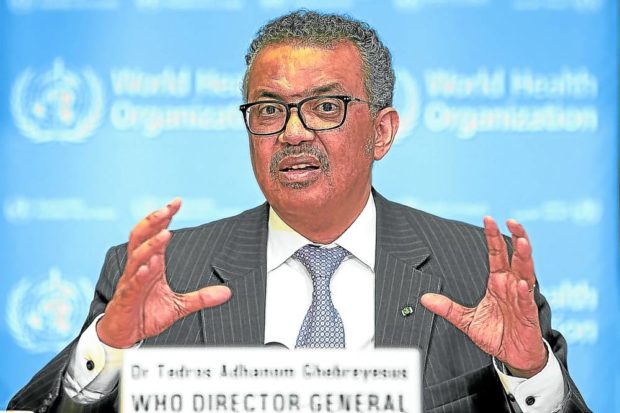
Tedros Adhanom Ghebreyesus —AP
World Health Organization (WHO) chief Tedros Adhanom Ghebreyesus has recommended to President Marcos that the country maintain the prevailing state of national calamity due to COVID-19 as this was the consensus of WHO experts.
Undersecretary Maria Rosario Vergeire, who is in charge of the Department of Health, said in a press briefing on Friday that Tedros made the recommendation during his meeting on Tuesday with the President after arriving for the 73rd session of the WHO regional committee for the Western Pacific.
Vergeire noted that the President, who had earlier said he intended to lift the state of national calamity and economic activity, said he “understood” the situation and seemed open to the advice.
The country was first placed under a state of national calamity for six months in March 2020 as the number of COVID-19 cases multiplied geometrically. It allowed the government to tap funds allotted for emergencies be disbursed rapidly.
It was subsequently extended twice—first in September 2021 and later in September 2022.
On Sept. 13, Mr. Marcos signed Proclamation No. 57 extending the period of state national calamity throughout the Philippines until Dec. 31, 2022.
The “state of calamity” is the country’s equivalent to the “public health emergency” declared by the WHO for pandemic response and prevention.
According to Vergeire, the President also asked Tedros for a “fearless forecast” on the global COVID-19 situation and the WHO chief pointed out that cases are rising again in some countries due to new immune-evasive COVID-19 strains.
More variants, more deaths
But he also told Mr. Marcos that the global health care response is “totally different now [than] two years ago” because of the available vaccines, antivirals and information that we have to keep the virus at bay.
Tedros said while the end of the pandemic was “in sight,” there was still the risk of “more variants, more deaths, more disruption and more uncertainty.”
“He told [Mr. Marcos] that countries are now moving forward. What we need to do is to preserve our health-care system capacity,” Vergeire said.
Mr. Marcos, on the other hand, said the government has resolved not to treat the pandemic as the emergency that it was in 2020, but he would be cautious in lifting the state of national calamity.
As the WHO Regional Committee meeting concluded on Friday, Vergeire said that member countries agreed on the need for a treaty on pandemic response that would foster coordination and partnership among countries.
“Because of the current pandemic, all [member states] agreed that this treaty should be [in place] because we need to be ready in situations like this,” Vergeire said, adding that “exchange of information” was vital in a health crisis.
The health official pointed out that when the COVID-19 pandemic began in 2020, “information was very sparse” and countries had to navigate their way through the early days to curb the spread of the virus.
The treaty was first proposed in May this year during the World Health Assembly held in Geneva.
READ: DILG: Continued state of calamity will enhance gov’t COVID response